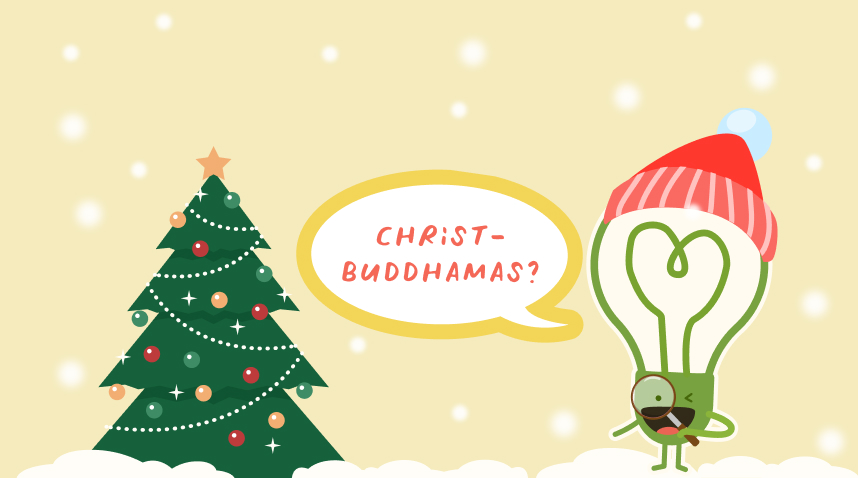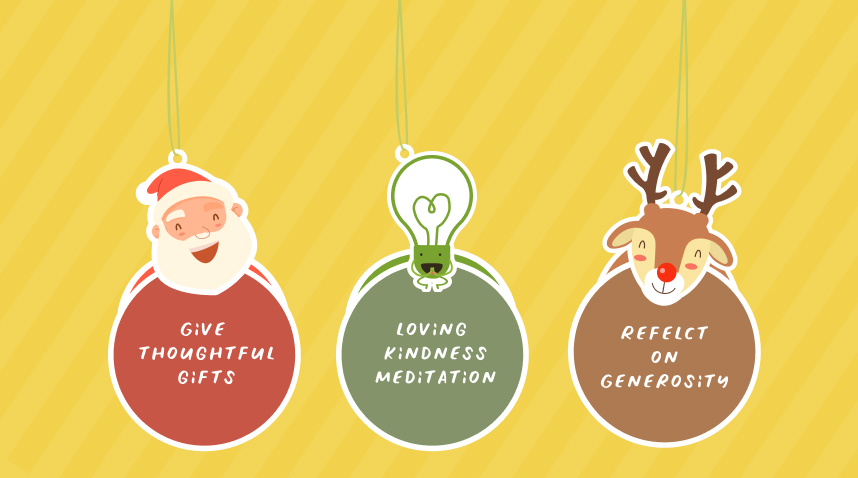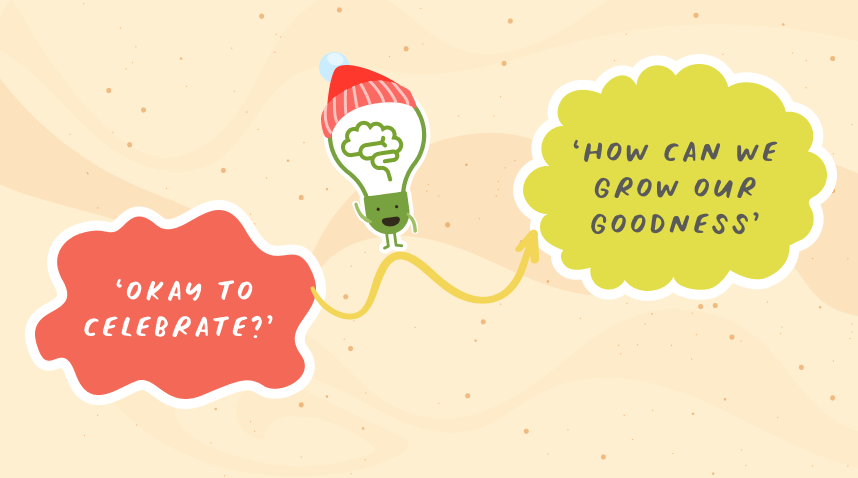TLDR: Can/should Buddhists celebrate Christmas? Is that the right question to ask? To give the intangible, share metta, and give up the unwholesome — these are some ways we can celebrate this season of giving.
The possible awkwardness in Buddhists celebrating Christmas
“You can meh?” was the start of that imagined awkwardness of a Buddhist celebrating Christmas. The notion of enjoying another religion’s holy day while being firmly grounded in Buddhism made me feel ‘awkward’.
The question arose as I walked with friends to observe the Christmas light up at Orchard road. “Should I be enjoying this?”, “Should I be singing Christmas songs and giving gifts?”, “Is this against what Buddha taught?” were thoughts that ran through my mind as my Christian friend asked me “You can meh?”.
He was concerned for a ‘serious’ Buddhist like me, who had to stroll through the nativity scenes put up in Orchard Road to celebrate Christmas. He thought that celebrating Christmas, the birth of Jesus Christ, might be ‘against my religion’.
Rather than asking, “okay to celebrate?” we should ask ourselves how we can grow our goodness this season.

A Christ-Buddhamas?
Often, we tend to divide our world into a binary one of ‘right’ or ‘wrong’, ‘us’ or ‘them’.
Learning the Buddha’s middle path of balance and wisdom helps pull us away from such extremes. We develop a tendency to slow down our reactions and enrich our responses to the world around us.
December, the month of Christmas, offers Buddhists and Christians alike an opportunity to reflect on a topic dear to both traditions: Giving. The late Thai forest teacher Ajahn Chah illustrates this best.
An excerpt from one of the recollections of his teachings:
—
How can they (monks) celebrate Christmas?
A group of the Western monks decided last year to make a special day of Christmas, with a ceremony of gift-giving and merit-making.
Various other disciples of mine questioned this, saying, “If they’re ordained as Buddhists, how can they celebrate Christmas? Isn’t this a Christian holiday?”
In my Dharma talk, I explained how all people in the world are fundamentally the same. Calling them Europeans, Americans, or Thais just indicates where they were born or the color of their hair, but they all have basically the same kind of minds and bodies; all belong to the same family of people being born, growing old, and dying. When you understand this, differences become unimportant.
Similarly, if Christmas is an occasion where people make a particular effort to do what is good and kind and helpful to others in some way, that’s important and wonderful, no matter what system you use to describe it.
So I told the villagers, ‘Today we’ll call this Chrisbuddhamas. As long as people are practicing properly, they’re practicing Christ-Buddhism, and things are fine.”
I teach this way to enable people to let go of their attachments to various concepts and to see what is happening in a straightforward and natural way.
Anything that inspires us to see what is true and do what is good is proper practice. You may call it anything you like.
—
Ajahn Chah’s tongue-in-cheek yet compassionate take on Christmas spreads the flavour of Dhamma better than any Christmas log cake.
We are often caught up with technicalities and terms, forgetting the essence behind them. We tend to see differences rather than similarities.
Applying Ajahn Chah’s comments to my experience, I should not have worried whether I was ‘violating’ the Buddha’s teachings by singing songs.
Rather I should have been more concerned whether the words I said were compassionate and kind. Was I ‘giving’ kindness to those that I spoke to? Did I give when the opportunity arose? Or did I hold back when others needed me?
What can we do this Christmas?
Beyond ‘doing’ Christmas stuff like eating, meeting friends and gift exchanges, how can we better embody the festive season this December as Buddhists?
Here are 3 ways.

1. Give thoughtful Gifts
Bring mindfulness into the act of giving. We may give someone a material gift that helps them through tough times or if we wish to ‘rebel’ against materialism, we can give our time and effort to friends.
Giving them a call, taking them out for tea/coffee, going for a hike are great ways to give! We may not have a lot of money to buy gifts, but we can give in many ways.
Recollecting that Jesus praised a poor widow who gave a few cents of her wealth as a greater gift than the rich crowd who gave a large sum. It is not the amount but rather the intention and heart that matters.
2. Sit! Do a loving-kindness (metta) meditation
This gift may not be an obvious choice to give during Christmas but it has strong lasting effects. The act of cultivating goodwill for all sentient beings and wishing them to be well and happy can change your attitude to friends, family, and your social circles.
This meditation technique is excellent for those of us who struggle with anger and jealousy. Sharing a feeling of gratitude and kindness with all beings softens our hearts and uplifts our minds.
This practice gives others a sense of protection that you will never harm them while keeping your mind light and bright (even brighter than the Christmas tree at Vivo City)
3. Reflect on generosity
Beyond giving thoughtful gifts & cultivating metta, we can delve deeper into generosity. The act of giving comes with the spirit of letting go. The eradication of “the attachment that comes from feelings of scarcity and separateness” as Vipassana teacher Philip Moffit describes Dana (Generosity).
For some of us, this might mean letting go of our greed and selfishness. For others, Christmas can be a time to examine biases towards people of other religions.
What matters is that we are giving up mind states that cause us to feel negative. We then open ourselves up to giving and love.

Same same but different?
These 3 ways can help us Buddhists celebrate the Christmas spirit of giving and not get caught up in the consumerism of gifts.
This attitude perhaps resonates with many churches who lament about the materialism that has plagued their favourite holiday. In this way, the holiday can be turned away from the usual feast of consumerism and toward a period of interfaith solidarity.
Following the 3 ways of making merit, giving can be seen as both a beginning to the Buddhist path and as a component of the path in its entirety. May you find the beginning of giving this Christmas!
So rather than asking ‘okay to celebrate?’ we should ask ourselves ‘how can we grow our goodness’ this season.
P.S. In case you are wondering if Buddhists have their ‘season of giving’, there is!
Theravādin countries (e.g. Thailand, Myanmar) celebrate Kathina, a festival where lay people offer basic goods to monks and nuns such as robes, bowls, medicine, and food. Monastics, in turn, give religious teachings to the laypeople. You can read more about this Buddhist season of giving here!
Wise Steps:
- Don’t get caught up by labels (e.g. Christmas) especially if that prevents you from practising the values of generosity.
- Find non-material ways to give! Be it metta meditation, being there for someone, or giving up bad habits


